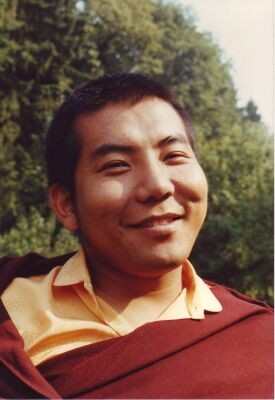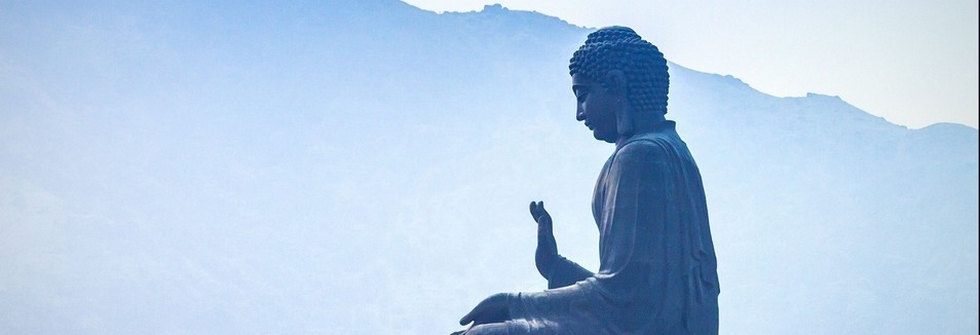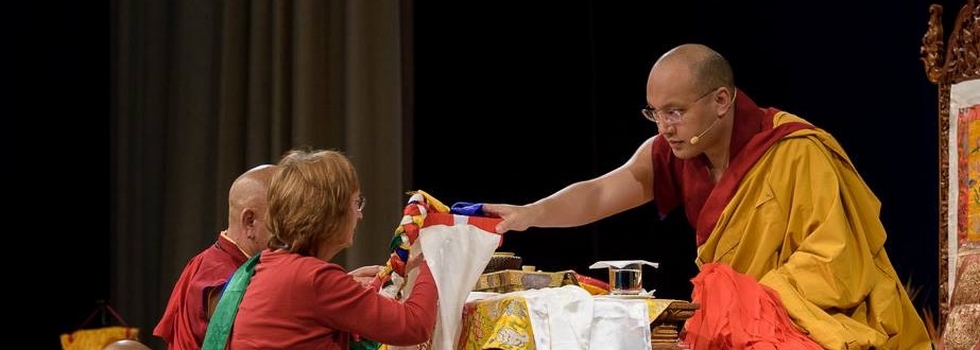Tantra in the West

His Eminence Jamgon Kongtrul Rinpoche the Third,
Karma Lodrö Chökyi Senge
Before speaking to you about Tantra in the West, I want to greet you kindly and say how happy I am to be at Karma Chang Chub Choephel Ling in Heidelberg.
There are many countries and nations in the world. As a result, there is a great variety of belief systems and customs followed by people living in a specific environment and community. This is why there are so many religions in the world. The many belief systems are based upon the aptitudes and intend to promote the welfare of its own followers. All religions have one thing in common, though, in that they aim to help its members to be happy. The intention of all religious tenets is the same, whereas each religions ' presentations of the spiritual path differ. I wish to speak about the highest level of Buddhist practice, which was studied and promoted in Tibet and is called"Vajrayana " or"Tantra. "
Buddha Shakyamuni presented innumerable instructions that are quite vast and very profound. He taught the relative truth about the way we apprehend everything that arises and appears to us and he taught the ultimate truth about the way those things really are. Both the relative truth of the way things arise and appear to be and the ultimate truth of the way things really are need to be studied and practiced together since each is true.
It was necessary for the Buddha to present many teachings and practices because of his disciple 's different inclinations, capabilities, and needs. Yet the innermost essence that all sentient beings have in common is identical, i.e., everyone is equally endowed with the potential - primordial wisdom - that is free of afflictive emotions obscuring wonderful qualities abiding within each and everyone. The nature of the mind of each and every living being is always and already perfect and pure. It is not the case that a few have a better intrinsic nature than others. But one isn 't able to realize the true nature of one 's own mind since one is obscured by afflictive emotions that conceal it, the emotions being the expression of a personal biography that make one person and being seem different than another. Everyone has a personal background and disposition, which certainly distinguishes an individual 's personality and character from that of others. Distinctions that have nothing to do with the indwelling true nature are certainly valid and depend upon the level and degree of a person 's consistent effort to eliminate own obscuring emotions. Since Lord Buddha 's many disciples had an immense variety of capabilities and dispositions, the Buddha taught a vast array of methods of practice so that disciples would be able to pacify and overcome emotional afflictions that conceal the true nature within.
All sentient beings are identical in their wish to be free of pain and to experience joy - they are identical in their attempt to eliminate any suffering and pain that they feel and in their attempt to maintain and increase their happiness and joy. All living beings are therefore the same in their basic hopes and fears. Yet, they do not experience the fulfillment of their hopes nor freedom from their fears because they turn their attention outwards and fiAght to defend any happiness they may have found for themselves and struggle to eliminate or avoid injuries and pain. Everything is impermanent and eventually gives way to loss and change, which is painful indeed. In an attempt to remain or become happy and to be free of suffering and pain through meaningless pursuits, though, living beings can only experience frustration that impermanence inevitably entails - and the never-ending struggle goes on as a result. This is the reason why beings are never satisfied and continuously experience anxiety instead of contentment.
Where does the initial mistake that brings on unsatisfactory experiences lie? In the habit of remaining involved with outer things while seeking happiness and while trying to eliminate or avoid pain, i.e., by falsely assuming that the outer world is responsible for good or bad luck. The Tibetan word for a Buddhist is nang-pa, which means"inwards. " Lord Buddha taught disciples practices to"look inwards " instead of outside themselves so that they are able to recognize their own situation and work with it. Outer conditions are very good in most parts of the West, a reason to be happy. Yet, the very fortunate outer conditions do not guarantee contentment. It is necessary to look inwards in order to reach a state of genuine contentment by engaging in practices that Lord Buddha realized and offered so freely.
As mentioned, one 's present state of mistaken apprehension as to the way things arise and appear does not accord with the mind 's true nature, which is ever and already perfect and pure. Mistaken experiences depend upon mind 's fundamental pattern that identifies the apprehending subject as"the self. " The self is not an inherent existent, although one erroneously clings to the belief that it is. Since one thinks that the self exisAts of its own accord and as a unique entity, one assumes apprehended experiences and things are"other " and distinct from the self and automatically clings to a dualistic outlook as a result. It is just this dualistic notion that gives rise to feelings of sympathy and antipathy, attachment and aversion, i.e., sympathy for those persons and things that live up to one 's expectations and aversion against those persons and things that obstruct one 's expectations. One 's expectations evolve from hopes and fears related to misleading assumptions of happiness and suffering. When feelings of sympathy and antipathy arise in one 's mind, other disturbing emotions naturally follow desire, anger, pride, jealousy, just to name a few. These afflictive emotions drive one to act the way one does with body and speech. One 's activities create karma, the"infallible law of cause and effect. " Living beings experience the result of their personal and collective karma in the active process of being and becoming.
It is necessary to become free of the initial delusion that is the source of suffering, the initial delusion being the mistaken belief in an apprehending self and apprehended objects that seem to be different and seem to stand in opposition to what one believes is the self. This initial delusion brings about feelings that necessarily give rise to frustrating karmic results. When free of the habit that causes one to experience attachment and aversion, then freedom from suffering will have been attained. No outer means can eliminate suffering and guarantee lasting happiness other than the practices of hearing, contemplating, and meditating the Buddhadharma. How does one proceed?
Buddhism instructs how to overcome erroneous modes of apprehension. It is very easy to describe this process and to intellectuAally understand it. In short, the mind is by nature pure and perfect. Not being aware of one 's own mind 's true nature, it is important to learn and appreciate that the essence of one 's mind is devoid of inherent existence. It is impossible to ever identify or describe the mind since it is ineffable. And all the while, limitless manifestations that existence unremittingly involves certify that the mind exists. Manifold and unceasing experiences occur because of mind 's capacity or quality of being. Everyone is endowed with a mind, a mind which is devoid of substantiality and, at the same time, clearly experiences; this aspect of the mind is called"clarity " or"lucidity. " By failing to realize mind 's empty essence, the apprehending subject is felt to be the self. Due to this fundamental error, apprehended objects are identified as different than the self and experienced as other than what one defines as the self. This deeply ingrained habit is the reason why the self feels separated from objects of perception. This process is in itself the initial mistake that brings about all injuries that karma then gives rise to. As said, it is easy to describe this process but very difficult to become free of one 's subtle habits. Why?
The mind that clings to a self as being different and distinct from objects of perception and cognition is not a concrete entity that can simply be thrown away. The subtle habit of clinging to a self needs to be relinquished at its root. We know how difficult it is to overcome coarse habits we have become accustomed to within the span of a few years, such as those related with tobacco, alcohol, drugs, and the like. The subtle habitual pattern, which has caused one to perpetuate karma and consequently experience the suffering that conditioned existence brings on has been accumulated since beginningless time and throughout countless lives. So we can understAand why it is very hard to really become free. As it is, the mental state of feeling separated is intensified as one grows older and time proceeds, unless it is overcome and eradicated by learning and practicing the steps that lead to freedom from painful delusions that feelings of separation always bring on. The methods that Lord Buddha presented are the path a practitioner follows in order to relinquish habitual patterns that only cause misery and woe.
Buddha Shakyamuni first taught the Four Noble Truths and delineated conditioned existence when he turned the Wheel of Dharma the first time. The Buddha showed that good and wholesome activities give rise to joyful experiences and taught that one needs to refrain from negative activities that irrevocably lead to suffering and pain. He presented the teachings on the Four Noble Truths of conditioned, conventional existence since this is our situation. The conventional truth of reality isn 't the ultimate truth but deals with experiences that ordinary beings encounter. Conventional reality is very real - it is vivid and alive due to habitual patterns. It is necessary to work with relative situations and to develop wholesome habits in order to counter the negative ones that have driven living beings to experience life the way they do. One can take vows and make the commitment to always engage in ethical behaviour of body and speech, which is a means to switch and change the patterns adhered to for so very long. Ethical behavior is the ground for all practices on the path and eventually enables a disciple to experience freedom from bondage.
Lord Buddha turned the Wheel of Dharma a second time and spoke about the ultimate truth of reality, which is the fact that all things are empty of inherent existence. At that time, he elucidated the Bodhisattva path to freedom, which consists of developing theA mind of enlightenment, the genuine aspiration to seek enlightenment and to practice the path for the welfare of all living beings. A Mahayana follower practices the path with the altruistic attitude, Bodhicitta, and slowly learns to overcome duality that brings on frustration and pain. As it is, living beings continually seek personal pleasures and shun any hardships by separating their experience of subject and object. By learning and practicing to see and cherish others more dearly than oneself and by realizing the ultimate nature of reality, which is emptiness, divided experiences slowly become pacified and eventually overcome.
The methods to overcome dividedness that Lord Buddha presented when he turned the First and Second Dharmachakra have various names Hinayana and Mahayana, Shravakayana and Pratyekayana, the Vehicle of a Bodhisattva, and so on. The teachings presented during the First Turning of the Wheel of Dharma concern relative experiences and elucidate the means to engage in wholesome activities and to maintain ethics of body, speech, and mind. They are a means to relinquish the erroneous belief in a self and the false mental superstition that there is no karma, no cause and effect - one of the most formidable assumptions of having a nihilistic view. The teachings Lord Buddha presented when he turned the Wheel of Dharma the second time concernpractices to realize emptiness of all things with superior knowledge, i.e., discriminating awareness. Developing discriminating awareness is the means to relinquish the erroneous belief in truly existing apprehended objects, the other mistaken erroneous assumption of having an eternalistic view. Eternalistic and nihilistic views are the cause for false and extreme beliefs that arise from the initial emotions of attachment and aversion.
The teachings and practices taugAht by the Buddha are divided into Sutra and Tantra. It is not the case that Tantra is a Tibetan invention that is taught by Tibetan Lamas. Vajrayana was taught by Buddha Shakyamuni and is based upon the Mahayana instructions. Tantra is a set of practices that incorporates both the relative and ultimate teachings and was taught by the Buddha when he turned the Wheel of Dharma a third time.
Tantra is called"the secret yana, vehicle " and offers methods of practice so that followers can transform their ordinary apprehension into the pure vision. Nothing needs to be eliminated or replaced, rather Tantra teaches how to develop and employ superior knowledge, i.e., discriminating awareness, to refine one 's limited mode of perception - from one of impurity into one of purity. The nature of reality is stainless. The practices of Tantra are very efficient during these times, times referred to as"dark ages, " dark because delusions are so obvious and extremely painful, outer distractions are overwhelming, and practitioners have little time. Most followers of the Buddhadharma, especially in the West, do not have the time to engage in all the detailed practices of outer discipline that the Hinayana recommends, in the minute analysis that the Sutrayana suggests be carried out. Therefore, the direct and efficient practices that Tantra offers are very beneficial during these"dark times. "
Tantra is especially beneficial for Westerners. The conditions in the West to practice Tantra are very favourable, but many emotional distractions and reactions towards the phenomenal world are overwhelming. It is possible to immediately satisfy all hopes without any hindrances, which isn 't possible in other parts of the world. Therefore, the powerful methods of Tantra are most effective when dealing with immediate and manifold diAsturbing situations, i.e., afflictive emotions that do overwhelm one. Vajrayana teaches how to recognize the essence of emotions immediately when they arise. Recognizing anger, for instance, the moment it arises, is a means to transform this harmful habit into loving kindness and compassion. One does not suppress anger and aggression nor analyze it for years and years. Rather, the Vajrayana instructions tell us how to recognize the nature of all disturbing emotions, and this recognition is the basis for transformative practices. Again, since disturbing emotions are so manifest and are without a doubt increasing, it is very beneficial and effective to practice Tantra in the West.
Enlightenment or realization of primordial wisdom means being free of delusions that bring on afflictive emotions, which depend upon whether one follows after and remains beset by disturbing emotions and perpetuates and intensifies negative karma as a result. Should a practitioner turn his or her attention inwards, it is then possible to transform negativities that harm oneself and others. Actually, primordial, timeless wisdom is so very near, so very close it lies within each and everyone. It is only necessary to study and engage in the practices taught by the Buddha so that the pure and changeless nature that always and already abides within each and every living being without exception naturally unfolds and manifests.
Thank you very much.
Questions & Answers
Question: I have a problem. How does one practice selflessness? We are people who can be misused. When people notice that I 'm altruistic, they try to tAake advantage of me. How does a selfless attitude really help?
Jamgon Lama: An altruistic attitude is very beneficial, even if other people think one is dumb on account of it. In that case, it is even more beneficial. It is also important to help others with skill since that is even more effective than helping without being skillful.
Question: If I don 't see myself as distinct from others, am I enlightened?
Rinpoche: What do you mean by"self? "
Same student: All people are different from each other. At enlightenment, they are not different.
Rinpoche: Egotism means clinging to a self and brings on the notion that the self and others are separate and independent of each other. Realization is omniscience, all-knowing clarity, which arises when clinging to a self ceases. A Buddha does not cling and therefore does not differentiate between subject and objects. That is why he has immense clarity, a clarity that ascertains the essence of all appearances that manifest.
Question: What are skillful means?
Rinpoche: There are two aspects: help one can give and discriminating awareness that discerns the ultimate nature of reality. Both need to be practiced together.
Question: This is a question I 'm really concerned about. How does Buddhism teach us to see women in general? What is their purpose in reincarnation?
Rinpoche: As said, the Buddha taught that all sentient beings are endowed with the Buddha nature, the pure nature of the mind, so it follows that there is no differeAnce between women and men. Women are free to practice and achieve enlightenment. Do you think women are different because they give birth to children? Emptiness and clarity continuously manifest and giving birth to children is an expression of mind 's clear nature.
Same student: In rebirth, women are born to be punished.
Rinpoche: Not only women, or?
Same student: Giving birth to a child is painful and creates samsara.
Rinpoche: I would not say that having children means giving birth to samsara. The source for samsara is clinging to a self. As long as one is not free of clinging to a self, having children is definitely samsara, which is marked by birth, ageing, sickness, and death. Even if one is free of clinging to a self, it doesn 't mean one is not born, because all Buddhas and Bodhisattvas do take on a Nirmanakaya birth to benefit others and are therefore born, too. It is not right to say that being born is samsara. Liberation from samsara means freedom from clinging. It is taught that all manifestations arise due to the law of interdependent origination. Whatever dies must have been born; whatever is born inevitably dies. That is the nature of reality, and reality is never wrong in itself. The only relevant point is whether the one who bears a child suffers or not.
Next question: Rinpoche, you said that if one recognizes the essence of disturbing emotions, such as anger, they can be transformed. Would you please explain this or give an example?
Rinpoche: The disturbing and afflictive emotions of anger, desire, greed, miserliness, and so forth arise because one clings to an apprehending self and apprehended objects. Former mental habits of the mind ripen as reactions of anger, for instance. Now, anger is not a concrete, self-existing, inherent thing one could ever point to since it is empty ofA an own existence. When habits ripen into afflictive emotions, one doesn 't respond verbally or physically, rather one looks inwards at one 's own mind and tries to find the essence of anger. One then discovers that it doesn 't exist as assumed and in the process of discovering its non-existence, the emotion naturally subsides. Therefore, the usual reaction of intensifying a negative habit is transformed - a very difficult practice. One needs to learn to recognize an emotion the moment one sees it arise, instead of becoming entangled by it and increasing its force by insisting that it is real. The practices are taught for this reason. I have not dealt with the practices here. Teachers recommend appropriate methods to their students.
Question: One method to become free of bad habits is to conduct one 's life positively. I understood that the more good one does, the more happiness one will experience. But life shows that we have no influence over the results of our actions, i.e., even if one does good with the best intentions, the results are not necessarily positive.
Rinpoche: Bad habits need to be overcome and eliminated. Self-cherishing and the disturbing emotions do not truly exist, are only habitual patterns that can be overcome. In order to become free of bad habits, you need to accumulate good habits. Afterwards, you need to go beyond both good and bad. Do you understand?
Same student: No
Rinpoche: When performing virtuous deeds, you accumulate merit and do not create negative karma. If you accumulate positive merit and expect a reward, you are clinging, which you also need to overcome.
Same student: Do you mean we need to overcome expectations?
Rinpoche: Yes, the heart of the matter is reaching the point beyond what is thought of as good or bad on a relative level. But, one first needs Ato practice goodness and then transcend that too. Not experiencing positive results from positive actions is often due to one 's strong expectations. Therefore, it is most important to wish for good than to focus one 's attention on immediate results.
Next question: Good and bad are valid, a pluralistic view. It is necessary not to evaluate but to recognize it as it is.
Rinpoche: What is your question?
Same student: Is enlightenment uprooting duality?
Rinpoche: Emptiness isn 't a nothing.
Same student: Yes, non-duality is a union of seeing things as they are without differentiating between good and bad.
Rinpoche: One only differentiates between good and bad as long as one sees things as truly existent. In fact, nothing exists the way it appears. Non-duality means seeing that all things are empty and yet clearly appear, which isn 't that easy.
Next question: Would you recommend that we become good Christians before we practice Buddhism?
Rinpoche: It is an individual matter. I taught that all religions are based upon the intention to help its proponents. The benefit one experiences varies, though. Buddhism originated in India and offers methods to investigate who and what we are, the real purpose of Buddhism. The basic truth of reality is a truth, otherwise we could not call it"basic, " and it does apply to all religions. This is why Buddhism is not a religion that opposes other religions. Buddhism is called"the middle, " i.e., it is beyond the extremes of claiming to be something special and distinct. Buddhism is beyond the erroneous assumptions of eternalism and nihilism and does not aim to stand in opAposition to any religion.
Thank you very much.
May the life of the Glorious Lama remain steadfast and firm.
May peace and happiness fully arise for beings as limitless (in number) as space (is vast in its extent).
Having accumulated merit and purified negativities, may I and all living beings without exception
swiftly establish the levels and grounds of Buddhahood.
Instructions of the Third Jamgon Lama presented at Karma Chang Chub Choepel Ling in Heidelberg, Germany in 1987. Transcribed & edited by Gaby Hollmann, apologizing for any mistakes, 2008.















